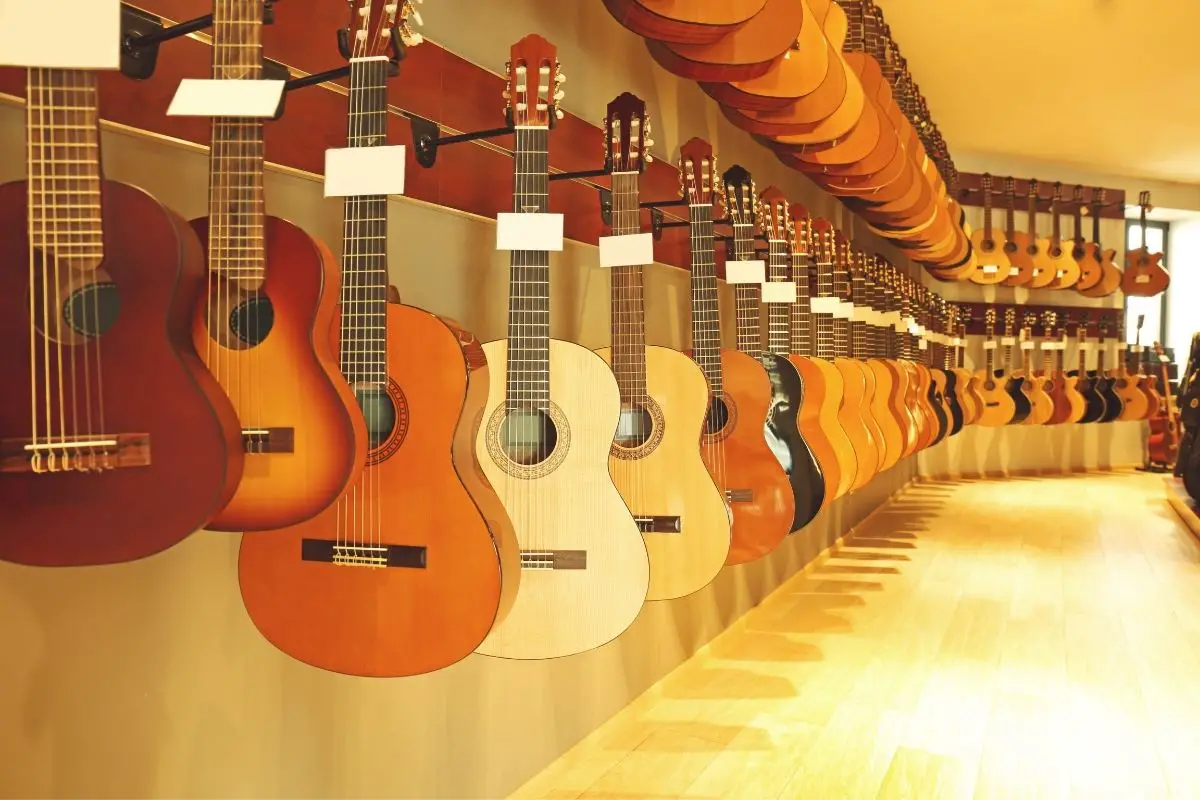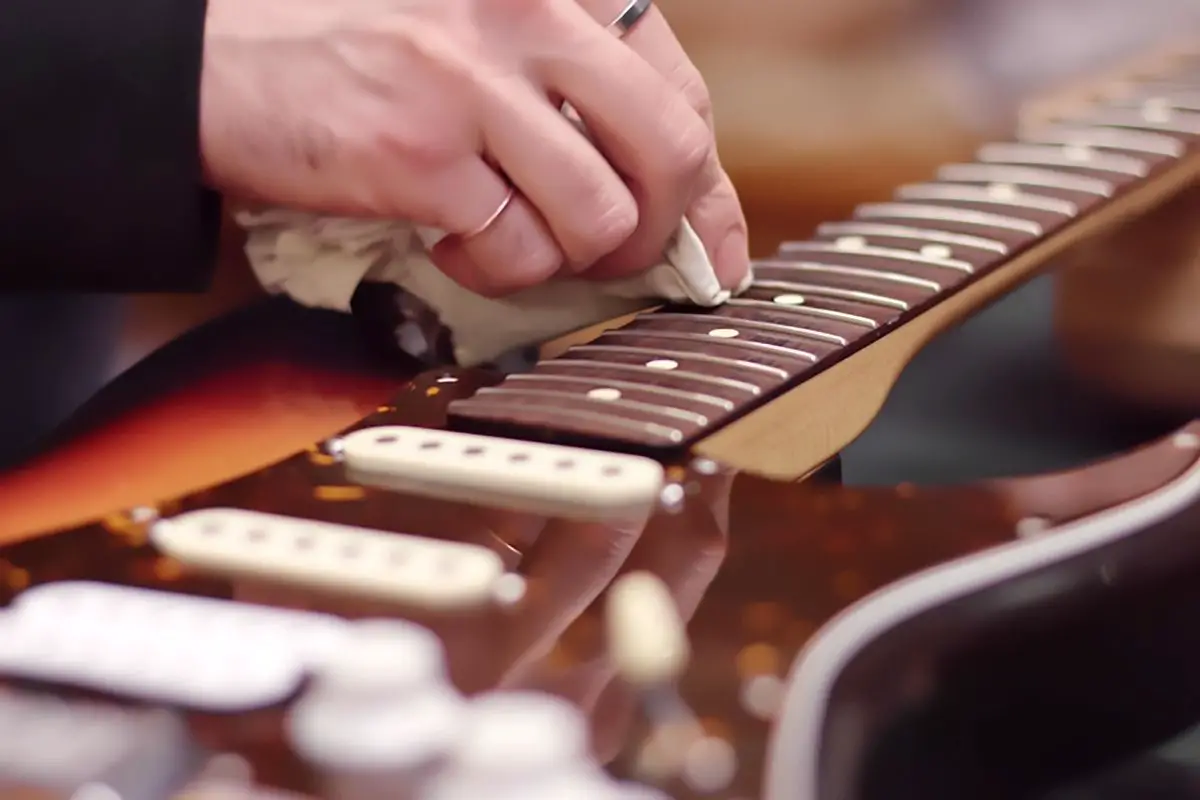Metal guitar picks have been a popular choice for guitarists for decades. They are known for their durability and unique sound.
However, many guitarists wonder if using metal picks can damage their strings. This article will explore the impact of metal picks on guitar strings and whether or not they are damaging.
Before diving into the impact of metal picks on guitar strings, it’s important to understand what guitar picks are and how they work.
Guitar picks are small, flat pieces of material that guitarists use to pluck or strum the strings. They come in a variety of materials, including plastic, nylon, and metal. Each material has its own unique sound and feel.
One concern that many guitarists have is whether or not metal picks can damage their guitar strings. Metal picks are harder than plastic or nylon picks, which can cause more wear and tear on the strings.
Over time, this can lead to a shorter lifespan for the strings. However, many guitarists argue that the unique sound and feel of metal picks is worth the extra wear and tear on the strings.
Key Takeaways on Do Metal Picks Damage Strings?
- Guitar picks are small, flat pieces of material that guitarists use to pluck or strum the strings.
- Metal picks are harder than plastic or nylon picks, which can cause more wear and tear on the strings.
- The unique sound and feel of metal picks is worth the extra wear and tear on the strings for many guitarists.
Understanding Guitar Picks

Guitar picks are small, flat objects used to pluck or strum the strings of a guitar. They come in different shapes, sizes, and materials, each with its own advantages and disadvantages. In this section, we’ll explore the different aspects of guitar picks that every guitarist should know.
You also shouldn’t miss:
- 5 Best Guitar Picks for Metal (Comparison & Reviews)
- Are Thin or Thick Picks better for Metal?
- Are Metal Picks Good for Guitars?
Material
Guitar picks can be made from various materials, including plastic, nylon, metal, and even wood. Each material has its own unique characteristics that affect the sound and feel of the pick.
1. Plastic Picks
Plastic picks are the most common type of pick used by guitarists. They are affordable, lightweight, and come in a wide range of thicknesses and shapes. Plastic picks are also easy to grip and produce a bright, crisp sound.
2. Nylon Picks
Nylon picks are similar to plastic picks but are slightly more flexible and produce a warmer, more mellow sound. They are often used for strumming chords or playing acoustic guitars.
Nylon picks usually last a lot longer than plastic picks as they can crack easily and generally dont last as long.
3. Metal Picks
Metal picks are less common than plastic or nylon picks but are favored by some guitarists for their durability and unique sound. However, metal picks can be harsh on guitar strings and may cause damage if used improperly.
4. Wooden Picks
Wooden picks are the least common type of pick and are usually handmade. They produce a warm, natural sound and are favored by some acoustic guitarists for their organic feel.
Shapes

Guitar picks come in various shapes, including standard, teardrop, and jazz. The shape of the pick can affect the way it feels in the hand and the sound it produces.
1. Standard Picks
Standard picks are the most common shape and are suitable for most playing styles. They have a rounded tip and a slightly pointed end, making them easy to grip and maneuver.
2. Teardrop Picks
Teardrop picks have a more pointed tip and a wider base, giving them a more precise attack and a fuller sound. They are often used for strumming chords or playing lead lines.
3. Jazz Picks
Jazz picks are smaller and thicker than standard picks, making them ideal for fast playing and intricate picking. They have a sharp tip and a beveled edge, allowing for precise control and articulation.
Flexibility
The flexibility of a pick can affect the way it feels in the hand and the sound it produces. Picks can range from very flexible to very stiff, with each level of flexibility offering its own advantages and disadvantages.
Flexible Picks
Flexible picks are often used for strumming chords or playing acoustic guitars. They produce a warmer, more mellow sound and are easy to grip and maneuver.
Stiff Picks
Stiff picks are favored by some guitarists for their precision and control. They produce a brighter, more articulate sound and are ideal for fast playing and intricate picking.
Impact of Picks on Guitar Strings

When it comes to playing the guitar, the choice of pick can have an impact on the strings. Here are some factors to consider:
1. Wear and Tear
Using metal picks can cause more wear and tear on guitar strings than plastic picks. This is because metal is harder and more abrasive than plastic, so it can cause the strings to wear out faster.
As a result, guitarists who use metal picks may need to replace their strings more frequently than those who use plastic picks.
2. Tuning
Using metal picks can also affect the tuning of the guitar. This is because metal picks can grip the strings more tightly than plastic picks, which can cause the strings to stretch and go out of tune. This is especially true for guitarists who play aggressively or use a lot of force when strumming or picking.
3. Lifespan
The lifespan of guitar strings can also be affected by the type of pick used. Metal picks can cause strings to wear out faster, which can shorten their lifespan. This means that guitarists who use metal picks may need to replace their strings more frequently than those who use plastic picks.
Influence of Picks on Sound and Tone
When it comes to the sound and tone of a guitar, the type of pick used can make a significant difference. The material and thickness of the pick can affect the sound produced, as well as the way the player strikes the strings.
In this section, we will explore the influence of picks on sound and tone for acoustic, electric, and classical guitars.
1. Acoustic Guitar

Acoustic guitars are known for their warm, natural tone. When using a pick, the material and thickness of the pick can affect the brightness of the sound produced. Thicker picks tend to produce a warmer, more mellow tone, while thinner picks can produce a brighter, more aggressive tone.
In addition to the material and thickness of the pick, the way the player strikes the strings can also affect the sound produced. A more aggressive tone can be achieved by striking the strings harder with the pick, while a softer tone can be achieved by striking the strings more gently.
2. Electric Guitar
Electric guitars are known for their versatility in tone, and the type of pick used can play a significant role in achieving different sounds. Thicker picks can produce a warmer, more rounded tone, while thinner picks can produce a brighter, more cutting tone.
In addition to the material and thickness of the pick, the way the player strikes the strings can also affect the sound produced. A clicking sound can be achieved by striking the strings more forcefully with the pick, while a smoother sound can be achieved by striking the strings more gently.
3. Classical Guitar
Classical guitars are known for their rich, full-bodied tone. When using a pick, the material and thickness of the pick can affect the sound produced. Thicker picks tend to produce a warmer, more mellow tone, while thinner picks can produce a brighter, more aggressive tone.
In addition to the material and thickness of the pick, the way the player strikes the strings can also affect the sound produced. A more aggressive tone can be achieved by striking the strings harder with the pick, while a softer tone can be achieved by striking the strings more gently.
Comparative Analysis of Picks

1. Metal vs Plastic
Metal picks have been known to cause damage to guitar strings. The main advantage of metal picks is their durability and longevity, as they can last longer than plastic picks. However, metal picks can also cause a harsher, metallic sound when playing the guitar.
Plastic picks, on the other hand, are softer and gentler on guitar strings, making them less likely to cause damage. They also produce a softer, warmer sound when playing the guitar. However, plastic picks may not last as long as metal picks and may need to be replaced more frequently.
2. Metal vs Nylon
Nylon picks are similar to plastic picks in that they are softer and gentler on guitar strings. They also produce a softer, warmer sound when playing the guitar. However, nylon picks may not be as durable as metal picks and may need to be replaced more frequently.
Metal picks may cause more damage to guitar strings compared to nylon picks. However, metal picks can produce a brighter, more metallic sound when playing the guitar. Metal picks are also more durable and may last longer than nylon picks.
3. Metal vs Wooden
Wooden guitar picks are the softest and gentlest on guitar strings. They produce a soft, warm sound when playing the guitar. However, wooden picks may not be as durable as metal or nylon picks and may need to be replaced more frequently.
Metal picks may cause more damage to guitar strings compared to wooden picks. However, metal picks can produce a brighter, more metallic sound when playing the guitar. Metal picks are also more durable and may last longer than wooden picks.
Notable Users and Brands

Famous Players
Metal guitar picks have been used by many famous guitarists over the years. One of the most notable users of metal picks was Brian May, the guitarist for the legendary rock band Queen.
May was known for using a sixpence coin as his pick, which he felt gave him a unique sound. Other famous players who have used metal picks include Eddie Van Halen, Kirk Hammett of Metallica, and Eric Johnson.
Popular Brands
There are many brands of metal guitar picks on the market today. One popular brand is Clayton Custom Guitar Picks, which offers a variety of metal picks in different sizes and thicknesses.
These picks are made from materials like brass, copper, and stainless steel, and are designed to provide a bright, crisp sound.
Another popular brand of metal picks is Dunlop, which offers a range of metal picks in various shapes and gauges. These picks are known for their durability and precision, and are used by many professional guitarists.
In addition to these brands, there are many other companies that produce high-quality metal picks. Some of these include Gravity Picks, V-Picks, and BlueChip Picks.
Experimenting with Different Picks

Many guitarists wonder if metal picks are harmful to their strings. To find out, several experiments were conducted using different types of picks.
During the first experiment, a guitarist played the same strings with a metal pick and a plastic pick. The results were inconclusive, as there was no noticeable difference in the wear and tear of the strings.
In the second experiment, a guitarist played with a metal pick for an extended period of time and then examined the strings for damage. While there were some minor scratches on the strings, they were not significant enough to cause any harm to the sound or playability of the guitar.
It is important to note that the preference of the player and their playing style can also affect the amount of wear and tear on the strings. Some players may prefer the sound and feel of a metal pick, while others may find it too harsh.
Ultimately, it is up to the player to decide which type of pick works best for them and their playing style. Experimenting with different picks can help a player find the perfect fit for their needs.
Additional Factors Influencing Guitar Performance
Guitar Type
The type of guitar can greatly affect its performance. Acoustic guitars tend to have a brighter and more resonant sound than electric guitars, which often have a heavier and more distorted sound. The type of wood used in the construction of the guitar can also have an impact on its sound and durability.
Playing Technique

The way a guitarist plays can also influence the performance of their instrument. Fingerstyle playing, for example, can produce a softer and more nuanced sound than strumming with a pick.
It is important to note that the type of pick used can also affect the sound of the guitar. Metal picks, for example, can produce a brighter and more aggressive sound than plastic or nylon picks.
Additional Equipment
The use of additional equipment such as pedals and amps can also have an impact on guitar performance. Pedals can be used to add effects such as distortion, reverb, and delay, while amps can be used to amplify the sound of the guitar.
It is important to choose equipment that complements the sound of the guitar and the playing style of the guitarist.
Conclusion
There is no clear-cut answer to whether metal picks damage strings. While some players swear by metal picks and have used them for years without issue, others have reported broken strings and increased wear and tear on their instruments.
It is important to note that the type of metal used in the pick can make a difference. Softer metals like brass and copper are less likely to cause damage than harder metals like steel. Additionally, the gauge of the pick can also play a role in how much pressure is applied to the strings.
Ultimately, the best way to determine whether metal picks are right for you is to try them out for yourself.
Pay attention to any changes in tone or playability, and be mindful of any signs of damage to your strings or instrument. With proper technique and care, metal picks can be a viable option for guitar players of all skill levels.
Frequently Asked Questions
Can using metal picks cause damage to guitar strings?
Metal picks can potentially cause damage to guitar strings over time. The metal material is harder than the strings and can wear them down faster than other materials.
However, this process is gradual and may not be noticeable for some time.
Are metal guitar picks harmful to acoustic guitar strings?
Metal guitar picks can be harmful to acoustic guitar strings, especially if they are not properly maintained. The metal material can cause wear and tear on the strings, which can lead to breakage or other damage.
Will using a metal pick damage my guitar strings?
Using a metal pick can potentially damage guitar strings over time, but it is not guaranteed. The extent of the damage depends on how often the pick is used, the force with which it is used, and the type of strings on the guitar.
Is it safe to use metal picks on acoustic guitars?
It is generally safe to use metal picks on acoustic guitars, but it is important to be careful and cautious. Metal picks can cause damage to the strings if they are not maintained properly, so it is important to regularly clean and replace them.
Can metal picks break guitar strings?
Metal picks can break guitar strings if they are not used properly or if they are worn down. It is important to use the correct technique and to replace worn picks to avoid damaging the strings.
Can leaving a pick in guitar strings cause damage?
Leaving a pick in guitar strings can cause damage over time, especially if it is not removed regularly. The pick can cause wear and tear on the strings, which can lead to breakage or other damage.
It is important to remove the pick after each use to avoid this potential problem.








